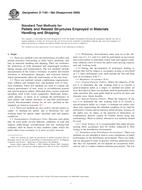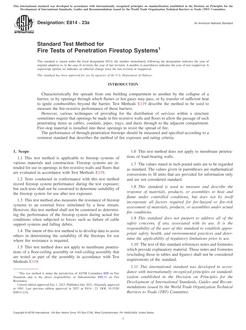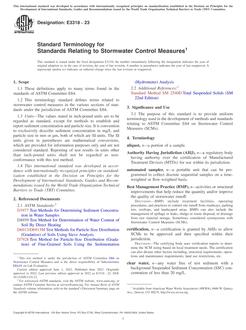ASTM D1185-98a(2009) 82 PDF Download

1.1 These test methods cover the performance of pallets and related structures, functioning as skids, bases, platforms, and bins in materials handling and shipping. Their use facilitates the protection of both packaged and unpackaged products during storage and transportation. The test methods include measurements of the relative resistance of pallets and related structures to deformations, damages, and structural failures which detrimentally affect the functionality of the unit load.
1.2 These test methods include conditioning requirements, static stiffness and strength tests, and dynamic tests of structural reliability. These test methods are used to evaluate the relative performance of new, used, or reconditioned general and special-purpose pallets fabricated from various materials including solid wood, wood composites, fiberboard, honeycomb, plastics, or metal, or to compare the performance of such pallets and related structures to specified performance criteria. Recommended criteria for all tests specified in this standard are listed in Appendix X2.
1.2.1 These test methods are also used to classify pallets as single- or multiple-use pallets and to determine the safe working loads for pallets under specified load and support conditions.
1.3 Nonmandatory Preliminary Tests – Because each pallet may be used under several different conditions of load and support, pallet-design considerations and safe working-load estimates shall be based on that condition under which the pallet offers least resistance or is most severely stressed.
1.3.1 Preliminary, short-duration static tests up to the ultimate (see 8.2, 8.3, and 8.4) shall be performed on previously non-tested pallets to determine which load and support conditions influence most severely the pallet load-carrying capacity and safe working loads.
1.3.2 During the development of prototypes leading to designs that will be subject to acceptance testing, as described in 1.4, these preliminary tests shall include the free-fall drop tests in accordance with 9.1.
1.4 Mandatory Acceptance Tests:
1.4.1 General-Purpose Pallets – When the objective of the test is to determine the safe working load or to classify a general-purpose pallet as a single- or multiple-use pallet, all tests described in these test methods shall be performed in the order specified. The same pallet shall be used for all static and dynamic tests, where feasible.
1.4.2 Special-Purpose Pallets – When the objective of the test is to determine the safe working load or to classify a special-purpose pallet, as a single- or multiple-use pallet, only those tests representing the intended condition of use shall be performed. Certain special–purpose pallet designs, because of the pallet size, its shape, or the material of fabrication, or combinations thereof, cannot be reliably tested using this methodology. When available, alternative test methods should be used.
1.4.3 Field Testing – It is recommended that pallet designs passing these acceptance tests be further subjected to field testing in the distribution environment.
1.5 Simulation of the Distribution Environment – These test methods are not intended to lead to exact simulations of pallet performance in the distribution environment. These test methods are designed to relate to practice with the added provision that they are repeatable, do not depend on exceptional skills, and are safe to conduct without elaborate precautions. The test findings are not expected to lead to unalterable conclusions. Testing in the distribution environment may be necessary to verify the results obtained from laboratory tests.
1.6 This standard does not purport to address all of the safety concerns, if any, associated with its use. It is the responsibility of the user of this standard to establish appropriate safety and health practices and determine the applicability of regulatory limitations prior to use. Specific warnings are given in 9.5.3.5.
Product Details
- Published:
- 03/01/2009
- Number of Pages:
- 11
- File Size:
- 1 file , 220 KB


